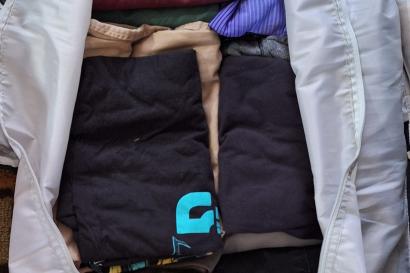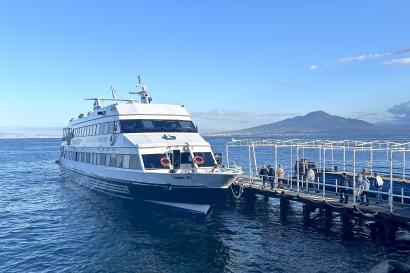
The end of this week marks one month since my arrival in Spain. With classes well underway I have finally established a daily routine. I know that doesn’t sound too enticing but honestly its nice to settle into a groove. For this blog post I thought I would focus on a topic that is not the most exciting but is still a huge component of your time overseas: academics.
Students (me included) often disregard the fact that they are enrolling in a STUDY abroad program. So before you overwhelm your semester with trips every weekend and plans to go out every night, consider some of the advice below. Note that these are developed from my personal experiences as an IES Abroad Salamanca student and people can have different ~words of wisdom~ depending on their specific program:
- Abroad classes are not always a guaranteed GPA booster.
Before flying off to Spain I was enamored by the claims of former abroad students that their course load overseas was significantly more manageable than that of Gettysburg. Being a Health Sciences major I was looking forward to the opportunity to replace long technical lectures and endless hours in lab with course material completely outside of my concentration. I had this idealized image in my mind of spending minimal time and effort in earning good marks in my courses, thus boosting my GPA (formerly scorched by the wrath of Organic Chemistry) while checking off a bunch of my school’s liberal arts requirements. I’m sorry to say that is not the case. The fact that I have never taken these courses in English is definitely a huge contributor since I don’t have a solid foundation on the general concepts or terminology… But even then, these are not the undemanding classes I was fantasizing about. So be prepared to devout time and effort in your courses. After all you are still in school, the walk to class is just a bit more enjoyable :)
- Take advantage of the fact that IES Abroad (and the majority of local universities) do not have classes on Fridays.
I am enrolled in 5 courses at the IES Abroad Center. I was HYPED to discover that none of them would run on Fridays. If you heed my aforementioned advice and stay on top of your assignments, you can utilize the three-day weekend to travel. However, don’t forget to spend some quality time in your host country as well.
- Be sure to keep in mind midterm, final paper and final exam dates when you do plan trips.
This one doesn’t require much explanation. You are provided with a complete academic calendar at the beginning of orientation. Please seriously consider if its really feasible to leave the weekend before two of your final papers are due.
- Be prepared to read a lot.
It has taken some time for me to adjust to the amount of reading I have to do for each class. Again, I’m a HS major so other people may be more accustomed to this. So far all but one of my classes provides 100% of the assignments in Spanish, which should be no surprise if you are considering the Study in Salamanca program. Don’t expect to be accommodated based on your level of Spanish. Professors provide texts that are not simplified nor “dumbed down”. Honestly the act of repeatedly having to translate a word into English and then proceeding to look up the definition of said word because you still have no clue what it means, can be headache inducing. Nevertheless, if you can make it through the initial struggle, you will be rewarded with noticeable improvements in your reading comprehension skills.
- Praise the professors who give readings in English.
Just do it.
- Extracurriculars, extracurriculars, extracurriculars!
Alright I know I sound like a high school guidance counselor trying to polish up the resumes of their advisees in preparation for college, but participation in activities outside of your course work can really enhance your time abroad. This is your opportunity to pursue your interests (or try something new) while meeting local students and facilitating your integration into your host country. Personally I have plans to take part in actividades en la naturaleza (an outdoor club) and the intercambios, both through USAL. Intercambios are usually with local students. You basically meet up with the other person and exchange language skills. Not only are you bettering your Spanish while helping someone with their English, but you can also gain a new perspective on student life and Spanish culture. I HIGHLY recommend you participate in this exchange.
- If you are super particular about your school supplies, buy them beforehand.
There are many papelerías around the city. That being said, I have noticed that the majority of notebooks here are comprised of graph paper instead of lined paper. It took me a few tries to find a place that carried the spiral bound notebooks we are accustomed to back home (check out Yuste Papelería on Calle Wences Moreno). Also I have yet to find normal two pocket folders. Its not a big deal, just something to think about if that kind of stuff matters to you.
- Most importantly, enjoy your semester abroad!
That is all I can think of for now. Hopefully you found this helpful and feel a little more prepared before starting your semester abroad.
Cariñosos saludos,
Izzie

Izzie Bautista
<p style="margin-bottom:12.0pt"><span style="color:#404040">My name is Isabel but unless you’re either my mom, dad or nurse calling me in from the waiting room, I go by Izzie. I am a rising junior at Gettysburg College pursuing a major in the Health Sciences with a minor in Spanish. I have traveled outside of the US before (namely the Philippines where a lot of extended family reside) however, visiting a country for vacation and being totally immersed in it are two completely different experiences and I can’t wait for this new adventure in Spain.</span><span style="text-autospace:none"><span style="font-size:16.0pt"><span style="font-family:"Times",serif"> </span></span></span></p>








